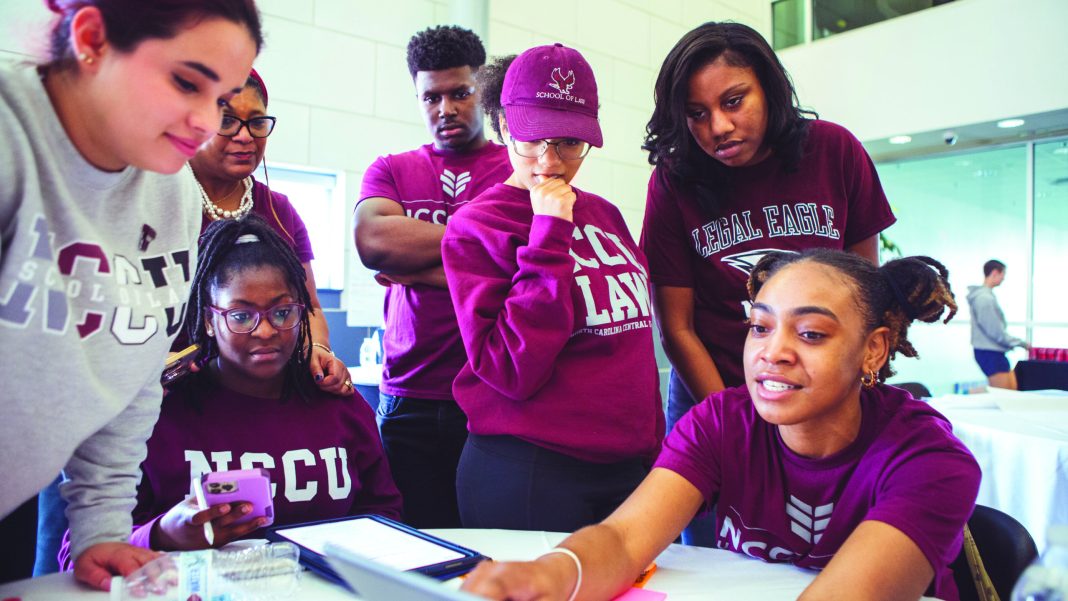Three years after a season of protests related to diversity and social justice, law schools continue to carry the mantle for research and change, with many launching innovative programs to address these topics.
North Carolina Central University School of Law
NCCU School of Law in Durham launched its Social Justice and Racial Equity Institute last year to help meet the needs of underserved people and communities.
It is a community research initiative that addresses systemic racism and other forms of inequality through interdisciplinary problem-solving to help bring about a just and prosperous society for all people.
“NCCU School of Law has been educating social justice advocates for over 80 years and most of our graduates accept public service positions, so the initiative aligns with our mission,” said Professor Malik Edwards.
The SJREI will also establish a research center to conduct and sponsor empirical research, draft and publish white papers, and host conferences and workshops on social justice issues. Guided by its research and workshops, the SJREI will work with community partners to engage in social impact initiatives that provide direct assistance to individuals and communities in need.
Students in the new program work on social justice and racial equity through policy research and scholarship.
Campbell University, Norman Adrian Wiggins School of Law
Campbell Law has partnered with the city of Raleigh, North Carolina, to aid low-income residents who are facing eviction and homelessness. Raleigh’s Housing Justice Project is a legal clinic run by lawyers and law students.
The partnership is part of the Blanchard Community Law Clinic, which has served more than 1,600 clients since opening in 2016. It will provide advice and counsel, as well as legal representation in eviction proceedings, to eligible Raleigh residents. Eligible residents must be at or below 200% of the federal poverty level.
Wayne State University Law School
Wayne Law in Detroit launched its Community Advocacy Clinic last fall, bringing together students and community members to study policy issues and develop ways to increase access to safe and affordable living.
Students work with tenants, study housing history and policies, and develop innovative housing solutions. These solutions include making recommendations on current Detroit city ordinances and gathering data on the effectiveness of various laws and policies.
Students also work as student-attorneys under the supervision of legal aid partners to provide representation in housing court as part of the school’s Warrior Housing Corps.
University of Southern California, Gould School of Law
This fall, USC Gould School of Law’s Student Affairs office launched programming that integrates diversity, equity, inclusion and student well-being. Nickey Woods, associate dean for student affairs, said the project will address the mental health challenges and isolation that many underrepresented students experience during law school.
“Research shows that law students who have a sense of belonging and psychological safety are more academically motivated and develop stronger friendships and mentorships, putting them in a better position to thrive,” she noted in an article.
Roger Williams University School of Law
In 2021, Roger Williams University became one of just a handful of law schools nationwide to add Race and the Foundations of American Law as a required course, supporting the law school’s mission to further student learning related to justice and develop students who are better prepared for the workforce.
The three-credit course focuses on the foundations of American law and the ways in which racial hierarchies and privileges have been codified and reinforced to become part of the status quo. Students who are encouraged to think critically about how the law was developed and who the law affects go on to become better advocates for their clients, for change and for equality, according to the Rhode Island law school.
Brooklyn Law School
The co-directors of Brooklyn Law’s Center for Criminal Justice have expanded the school’s experiential model with an innovative approach to legal education called Rethinking Justice. It brings formerly incarcerated individuals into classrooms not only to tell their stories but also to work with student fellows to create strong, effective learning experiences.
Rethinking Justice connects members of VOCAL-NY and the Survivors Justice Project with four sponsored student fellows to generate teaching materials and plans for first-year classroom visits. Each fellow received a $3,000 stipend for the year and devotes between two and five hours a week to the project. Members of the partner organizations, who are also paid, work with the fellows to create presentations for Criminal Law classes.
“We knew students were eager for new perspectives in the classroom, but we didn’t realize just how many students would say that this was one of the most important classes they had in law school,” said Jocelyn Simonson, associate dean for research and scholarship.

